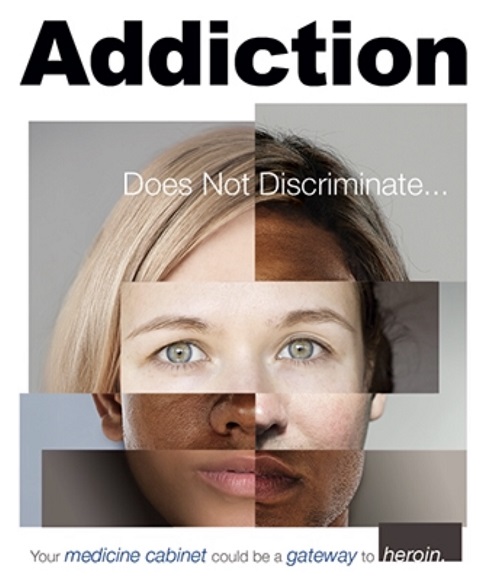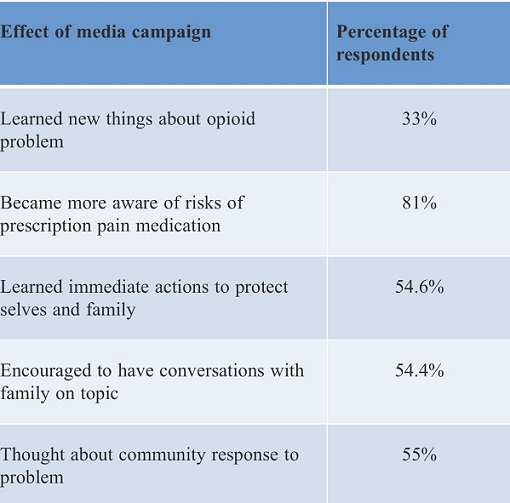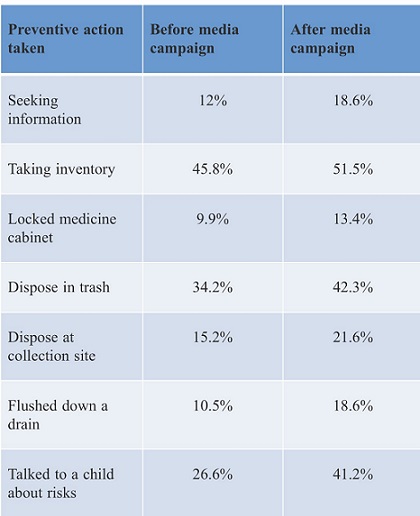

Media messages motivate New Jersey residents to take action steps to prevent opioid abuse in their homes and communities, according to a
study recently released by the Partnership for a Drug-Free New Jersey (PDFNJ).
The study found that adults who received information through a targeted media campaign took an average of at least two preventive measures compared to only one preventive measure taken by those not exposed to this information.
Preventive actions assessed in the study included seeking more information, locking medicine cabinets and disposing of unused medications in various ways. The number of adults who talked to a child about the risks of opioids increased by nearly 15 points, from 26.6 percent before receiving campaign information to 41.2 percent following the campaign. The campaign targeted adults in a mid-sized New Jersey community with a low incidence of opioid and heroin addiction.

“The results of the study show the value of education and awareness in addressing the opioid epidemic gripping New Jersey,” said PDFNJ Executive Director Angelo Valente. “Helping residents to understand the link between prescription painkillers and heroin use is an important step in this fight and a key part of encouraging action to prevent drug misuse.”
The study assessed the potential impact of a media-intensive outreach campaign through distribution of opioid prevention, education and awareness messages to residents via direct mailings, email blasts and door-to-door canvasing.
“Research suggests that there is a persistent gap in the level of public knowledge and concern about the opioid addiction problem in communities that are not experiencing the outcomes of opioid addiction in the same intensity as other communities,” said Dr. Izthak Yanovitzky, an associate professor in the Rutgers Department of Communication. “This means that we need to use more targeted media campaigns in these communities to make sure they catch up and are prepared to respond effectively to the problem.”

Many respondents who remembered receiving information from PDFNJ said they had learned more about the impact of the opioid issue and were motivated to take further steps to address it in their homes or community.
“No community is immune to the opioid epidemic,” Valente added. “Media campaigns detailing the risks of prescription painkillers, as well as the actions parents and other adults can take to protect themselves and their children, are vital to tackling this crisis.”
###
Best known for its statewide anti-drug advertising campaign, the Partnership for a Drug-Free New Jersey is a private not-for-profit coalition of professionals from the communications, corporate and government communities whose collective mission is to reduce demand for illicit drugs in New Jersey through media communication. To date, more than $100 million in broadcast time and print space has been donated to the Partnership’s New Jersey campaign, making it the largest public service advertising campaign in New Jersey’s history. Since its inception the Partnership has garnered 166 advertising and public relations awards from national, regional and statewide media organizations.

 Media messages motivate New Jersey residents to take action steps to prevent opioid abuse in their homes and communities, according to a study recently released
Media messages motivate New Jersey residents to take action steps to prevent opioid abuse in their homes and communities, according to a study recently released “The results of the study show the value of education and awareness in addressing the opioid epidemic gripping New Jersey,” said PDFNJ Executive Director Angelo Valente. “Helping residents to understand the link between prescription painkillers and heroin use is an important step in this fight and a key part of encouraging action to prevent drug misuse.”
The study assessed the potential impact of a media-intensive outreach campaign through distribution of opioid prevention, education and awareness messages to residents via direct mailings, email blasts and door-to-door canvasing.
“Research suggests that there is a persistent gap in the level of public knowledge and concern about the opioid addiction problem in communities that are not experiencing the outcomes of opioid addiction in the same intensity as other communities,” said Dr. Izthak Yanovitzky, an associate professor in the Rutgers Department of Communication. “This means that we need to use more targeted media campaigns in these communities to make sure they catch up and are prepared to respond effectively to the problem.”
“The results of the study show the value of education and awareness in addressing the opioid epidemic gripping New Jersey,” said PDFNJ Executive Director Angelo Valente. “Helping residents to understand the link between prescription painkillers and heroin use is an important step in this fight and a key part of encouraging action to prevent drug misuse.”
The study assessed the potential impact of a media-intensive outreach campaign through distribution of opioid prevention, education and awareness messages to residents via direct mailings, email blasts and door-to-door canvasing.
“Research suggests that there is a persistent gap in the level of public knowledge and concern about the opioid addiction problem in communities that are not experiencing the outcomes of opioid addiction in the same intensity as other communities,” said Dr. Izthak Yanovitzky, an associate professor in the Rutgers Department of Communication. “This means that we need to use more targeted media campaigns in these communities to make sure they catch up and are prepared to respond effectively to the problem.”
 Many respondents who remembered receiving information from PDFNJ said they had learned more about the impact of the opioid issue and were motivated to take further steps to address it in their homes or community.
“No community is immune to the opioid epidemic,” Valente added. “Media campaigns detailing the risks of prescription painkillers, as well as the actions parents and other adults can take to protect themselves and their children, are vital to tackling this crisis.”
###
Best known for its statewide anti-drug advertising campaign, the Partnership for a Drug-Free New Jersey is a private not-for-profit coalition of professionals from the communications, corporate and government communities whose collective mission is to reduce demand for illicit drugs in New Jersey through media communication. To date, more than $100 million in broadcast time and print space has been donated to the Partnership’s New Jersey campaign, making it the largest public service advertising campaign in New Jersey’s history. Since its inception the Partnership has garnered 166 advertising and public relations awards from national, regional and statewide media organizations.
Many respondents who remembered receiving information from PDFNJ said they had learned more about the impact of the opioid issue and were motivated to take further steps to address it in their homes or community.
“No community is immune to the opioid epidemic,” Valente added. “Media campaigns detailing the risks of prescription painkillers, as well as the actions parents and other adults can take to protect themselves and their children, are vital to tackling this crisis.”
###
Best known for its statewide anti-drug advertising campaign, the Partnership for a Drug-Free New Jersey is a private not-for-profit coalition of professionals from the communications, corporate and government communities whose collective mission is to reduce demand for illicit drugs in New Jersey through media communication. To date, more than $100 million in broadcast time and print space has been donated to the Partnership’s New Jersey campaign, making it the largest public service advertising campaign in New Jersey’s history. Since its inception the Partnership has garnered 166 advertising and public relations awards from national, regional and statewide media organizations.